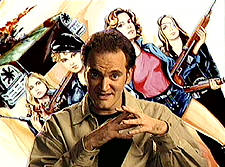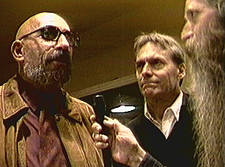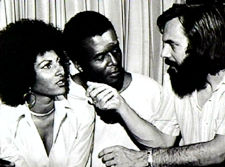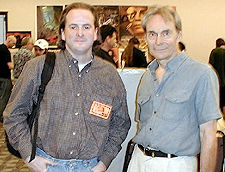
Accidental Exploiteer
BY G. NOEL GROSS | February 15, 2002
Click for the first of this two-part tribute.
 Legendary exploitation filmmaker Jack Hill is no schlockmeister. His movies defy expectation by exhibiting true artistry amid unique, salacious and often shocking action tales. Attributes which have elevated his '70s-era films to cult classic status worldwide and captured the attention of a new generation of fans. In this exclusive interview, the 60-something auteur muses about being engulfed by Hollywood's remake frenzy, his influential student film, the miraculous restoration of Spider Baby and reflects on a day many, many moons ago when sequels were, gulp, TABOO! Legendary exploitation filmmaker Jack Hill is no schlockmeister. His movies defy expectation by exhibiting true artistry amid unique, salacious and often shocking action tales. Attributes which have elevated his '70s-era films to cult classic status worldwide and captured the attention of a new generation of fans. In this exclusive interview, the 60-something auteur muses about being engulfed by Hollywood's remake frenzy, his influential student film, the miraculous restoration of Spider Baby and reflects on a day many, many moons ago when sequels were, gulp, TABOO!
- While researching for this interview, I came across an item claiming they're preparing a Foxy Brown remake.* Had you heard about that?
- Well, I wouldn't say it's actually being prepared. It's been under discussion. MGM owns the rights and there's a company that's been discussing doing that with them for quite some time. It's been dragging on for more than a year. [Laughs.] They've still got their legal department working on it, trying to make sure that nobody else has any claim on the rights, which is just preposterous. MGM, as you must know is, uh, well, it's supposed to be on the block, so I don't know if they're making decisions or not. They say they want to do it, that they definitely want to go ahead, but they won't say when.
- Sounds pretty typical. Would you be involved with it in any way?
- I've been asked by the producers to be involved. Basically, I said, "Sure, let me know when it gets going." I'm not holding my breath. [Laughs.]
- How do you feel about the idea of a remake?
- I have mixed feelings about it. To me, it would be an opportunity to do what I would have liked to have done with the original if I had the money. [Laughs.] I don't know. It's hard to say. I have very mixed feelings about it, but I'm open to anything.
- I've had the opportunity to review all your DVDs, and beyond enjoying the movies, the most consistent thing about them is the quality of your commentary tracks. Were they a chore, or did you enjoy recording them?
- Oh, thank you. I did enjoy doing them. The circumstances under which I made most of my films were such that I think I can pass on some interesting things that filmmakers might benefit from.

Revivalist Quentin Tarantino praises Hill's cult classics.
|
 - Certainly! One of the neatest bonus nuggets is on the Switchblade Sisters disc, which is your student film, The Host. I believe you finished it for the release. How did that come about?
- Quentin Tarantino had heard, and it's true, that the last part of Apocalypse Now is kind of based on my film. He thought it'd be a good thing to put on there so people could see it, as a historical thing. He's just the kind of guy who if he likes an idea of doing something, he'll just go for it. The film only existed in a 16mm work print that had been stored in my garage for 30 years. I didn't even know if it was playable, or if the soundtrack was any good. So we got it out, had it cleaned, ran it and the soundtrack was fine, but the film was never finished. In those days at UCLA, you could only actually finish a film if you had the money and did it yourself. The university didn't have it in its budget to finish a film, which is rather costly. It was just assembled in an edit and there was some sound missing where the recorder had failed, so Quentin got Miramax to put up the money to finish it. We did a couple inserts and pick ups. I got back the original actress just by a miracle of good luck. I was able to find her via the internet in a second and she actually lived close by me! She was able to come down and replace some dialogue. The same with Sid Haig. And I got a composer that I worked with to score the film. We did the effects and everything. It was a lot of fun doing it!
- It was a lot of fun to see! That's also an important film, because that's when you first met up with Sid Haig. You've called him your favorite actor.
- That's right. My favorite actor with whom I've actually worked. He's just so astonishingly versatile and such a wonderful guy. He's so great to work with, that's all I can tell you.
- I think he plays a fantastic redneck character. Like you say, he's good in all sorts of roles. A heavy. A comedian. He's just always great to watch. Spider Baby is one example of just how good he is. In the disc's liner notes you wrote about how you'd found its original answer print and it sounded as though there was more of a story there.
- The answer print was the complete uncut version of the way I had finished the picture. There were six minutes of footage missing from the released version. Quentin was actually able to get me the negative, because the lab that had it locked up in their vault was the same lab that Miramax put all their materials in. [Laughs.] So they gave it to me as abandoned property. But I had totally forgotten the answer print. In fact, every time I saw the film in the release print I had, I felt there was something missing. There was something else that we'd shot that wasn't there, but I wasn't sure what it was. Then from the air, the daughter of the man who'd ended up owning the film, he had died, and I was able to contact her and she told me she thought there were a lot of prints stashed away in a storage facility in Santa Monica. I purchased the material from her, and when we opened the vault there were like 18 prints of Spider Baby in there. When I examined the prints, most of them were in pretty bad shape. They'd been run a lot. They had arc burns from the drive-in theater projectors. But I basically cannibalized the prints and got about five really good quality release prints. And during the process, I noticed that one of the prints was longer than the others. So I examined it closely and through the identification on the film discovered that it was printed on Gavaert stock. It was in absolutely mint condition and I realized it was the original answer print before it was cut by the distributor. The quality of the print was excellent, because it was printed on a much finer stock. In those days, when labs wanted to show the producers an answer print, they used a much more expensive film stock than what was used for the release prints. So we transferred that to get the additional missing footage, which we couldn't edit into the picture.

Hill and Sid Haig at the reunion screening of Spider Baby.
|
 - But it's wonderful to be able to see it, and anything more with Lon Chaney, Jr. is a good thing.
- Right. Ultimately, I felt the distributor had maybe done the right thing in cutting the picture. He cut a little bit more than I would have cut, but I think he made some good choices. I felt for real fans of the movie, it was a chance for them to see their favorite dysfunctional family a little more, so we put that on the DVD.
- Spider Baby was your own inspiration, from then, you started working on assignment-oriented projects with Roger Corman and then Sam Arkoff. How would you compare the two men?
- They're totally, totally different. Arkoff was a business man. Roger is a real filmmaker himself. He's really talented. I think he could have done great work if he hadn't been so tight on the money himself. [Laughs.] Some of his films show some real talent. They're only limited by his unwillingness to spend the money and really do it right.
- You said during the Big Doll House commentary that you were basically sent to the Philippines with a list of gags, things like girls wrestling in the mud. Was that typical to a lot of the movies you did?
- Oh, no, not at all. In this particular case, Roger had just created New World Pictures and he had a partner, Larry Woolner, who had, with his brother Barney Woolner, been in a real kind of cheapy, grindhouse movie business for quite some time. He saw his partnership with Roger as a chance to really take a step up to better things. But, basically, he really wanted the assurance of having certain things. I think he was the one who said they wanted girls fighting in the mud. That wasn't in the script. I made a lot of changes, but I did give them that.
- You don't approve of the notorious extra line of plot-twisting dialogue at the end of that picture. Why didn't New Concorde drop it from its latest release?
- They said they were going to. Maybe they couldn't for technical reasons. It's still in there? It's just a voiceover layed in there that they could have taken out. It wasn't in the original release of the movie. I think it was put in at some point later for the video version. It may have been put in for a foreign release. It's really strange. I was totally astonished the first time I heard that. That someone had done that. Nobody at Concorde knew anything about it, or why it had been done, when or anything. It's one of those mysterious things. [Laughs.] If you ignore it, it doesn't really matter.
- That's right! Just hit the mute button at that point. Something you've done, that I find interesting, is actually go to watch your films with audiences just to see their reactions. Was that beneficial?
- I think as a director and as a writer it's essential. You really must do it. So many filmmakers are totally removed from audiences because they only see the movies in screenings with their friends and other people. It's very important to see your film in theaters in different places with different kinds of audiences. You see what you've done wrong. You see what you've done right. Sometimes you get great surprises.

Jack directs Pam Grier -- the reigning Queen of Blaxploitation.
|
 - When you made Coffy, there was a sequel taboo, which is certainly something Hollywood doesn't have now. You'd wanted Foxy Brown to be a true sequel to Coffy. Who were the naysayers?
- The head of production at AIP, Larry Gordon, was a very, very smart guy and he felt we could have a franchise. But the sales department didn't agree and in companies like that, they have the final word. They had some sequels that weren't doing well, so "no more sequels." As a result, we changed the name of the character.
- You still got a monster hit out of it. Both pictures are part of the "blaxploitation" genre. That's a term I think confuses a lot of people, especially in our new politically correct culture. What would you say to those who misinterpret it to mean the exploitation of blacks?
- The term never had that meaning at all. I'm sure it was just a word that was invented by somebody at Variety or the Hollywood Reporter. They used to talk about exploitation and sexploitation and so blaxploitation. It doesn't mean that it's exploiting black people. What they meant was that it was an exploitation film intended for black audiences. That's all. None of the guys working on the movie felt exploited.
- You rightfully express a lot of pride in your blaxploitation films.
- More than once I've met black women who've told me when they were very young their mothers told them they should watch Coffy to see what it was really like in those days. I can tell you that the DVDs have been selling like crazy. I was invited to a film festival last year in France where they showed Foxy Brown and Coffy in French language versions. And they were recently showing in Italy in Italian language versions.
- That's fantastic. After Switchblade Sisters, you didn't make another film until Roger Corman talked you into returning to do Sorceress, but you wound up asking that your name not go on the picture. What happened?
- I wouldn't say he talked me into it. He said he wanted to make a sword and sorcery movie. He had this special effects house, that he owned, that was doing really good work. And he wanted to do a really big-looking movie, so I went for it. That's what I needed. A movie that looked big and flashy to get me out of the category of shoestring budget movies. But it didn't turn out that way.
- I guess maybe that's also the appeal of the Foxy Brown remake?
- I think they just like the title. [Laughs.]
- You have a script for a romantic comedy that you'd like to do?
- I've got a couple. And this week, I'll have a script finished that's kind of a romantic comedy take off on film noir. Part thriller. Part romantic comedy. It's called Don't Ask.
- I've also read that you've been working on novels?
- Yes, I was for quite some time. I really got very serious about it. But largely because of Quentin, and the '70s revival with blaxploitation and all that, I got a lot of interest in me doing a film, so I just put all that on the shelf and wrote screenplays.
- Is anything gelling more than anything else?
- It's hard to tell. I've been through so many deals that fell through. So many people who had financing and turned out to be flakes. It's been depressing. [Laughs.] I've just decided to write some really good screenplays and keep talking to people about directing movies. In fact, I'm meeting with a company tomorrow who wants to do a remake of Spider Baby. [Laughs.] I'm not sure to what extent I want to be involved.

Yours truly with Mr. Hill at Fangoria's Weekend of Horrors.
|
 - Well, it can't hurt to talk to someone. Are there any other of your films that'll eventually show up on DVD? Maybe some of your early, early nudist pictures?
- No, I have no connection and nothing that I'd be interested in. Although I just saw on the internet that Mondo Keyhole is out on video tape. Actually, pirated copies have been out for some time, but the producer just made a deal with a distributor to put it out with a nice cover. [Laughs.] It is an interesting film because, while my name isn't on it as director, I did in fact write and direct it. My name is on it as director of photography and the film is of interest to film buffs or film students because of some really tricky things I did with the camera. Really experimental things. That's how I used the opportunity of doing an out and out sexploitation movie, although there's not really any real nudity in it. In those days you couldn't show much.
- You've had tremendous success in low budget pictures. What do you think is the lasting appeal of your movies?
- If you're asking me why are all my films considered classic cult films and finding new generations of fans when a lot of others are lost and buried forever? If that's the question? [Laughs.]
- I'm not sure I'd put it like that! [Laughs.] But, OK, you can go with that.
- Well, it's because I tried to give my films more than just the surface sex, action and violence that was called for, although that was an essential, or I wouldn't have been able to work. I tried to give them more depth and humanity and character.
- Amen! That's precisely why I'm so pleased to honor your work. Thank you so much for your time and good luck to you, Mr. Hill.
* Columnist's note: Mr. Hill was unaware of this announcement at the time of our interview ... VARIETY: Feb. 7, 2002 -- 'Brown' still foxy to Lion: 'Menace's' Williams to work on remake -- MGM and Absolute Entertainment are teaming to remake "Foxy Brown," a pic that stands as a classic of the blaxsploitation era. Tyger Williams, who wrote the 1993 "Menace II Society," is onboard to adapt. In the 1974 original, which was produced by American Intl. Pictures, Pam Grier portrayed Foxy Brown -- a sexy, butt-kicking woman who took no prisoners as she sought to take down the men who murdered her boyfriend and brother. It was written and directed by Jack Hill, who also teamed with Grier on other blaxsploitation standards like "The Big Doll House," "The Big Bird Cage" and "Coffy." MGM holds the underlying rights to the original "Foxy Brown" as part of its library. Absolute's Marcus Morton ("Three Strikes") and Julio Caro ("The Cell"), who will produce the film, pitched their take on the pic to MGM production prexy Alex Gartner. He will oversee the production with story editor Kristen Lowe. Absolute, which has a first-look deal at MGM, also is developing an urban remake of "Nine to Five" with Overbrook Entertainment for Fox Searchlight. -- Dana Harris
G. Noel Gross is a Dallas graphic designer and avowed Drive-In Mutant who specializes in scribbling B-movie reviews. Noel is inspired by Joe Bob Briggs and his gospel of blood, breasts and beasts.
|

 Legendary exploitation filmmaker Jack Hill is no schlockmeister. His movies defy expectation by exhibiting true artistry amid unique, salacious and often shocking action tales. Attributes which have elevated his '70s-era films to cult classic status worldwide and captured the attention of a new generation of fans. In this exclusive interview, the 60-something auteur muses about being engulfed by Hollywood's remake frenzy, his influential student film, the miraculous restoration of Spider Baby and reflects on a day many, many moons ago when sequels were, gulp, TABOO!
Legendary exploitation filmmaker Jack Hill is no schlockmeister. His movies defy expectation by exhibiting true artistry amid unique, salacious and often shocking action tales. Attributes which have elevated his '70s-era films to cult classic status worldwide and captured the attention of a new generation of fans. In this exclusive interview, the 60-something auteur muses about being engulfed by Hollywood's remake frenzy, his influential student film, the miraculous restoration of Spider Baby and reflects on a day many, many moons ago when sequels were, gulp, TABOO!








